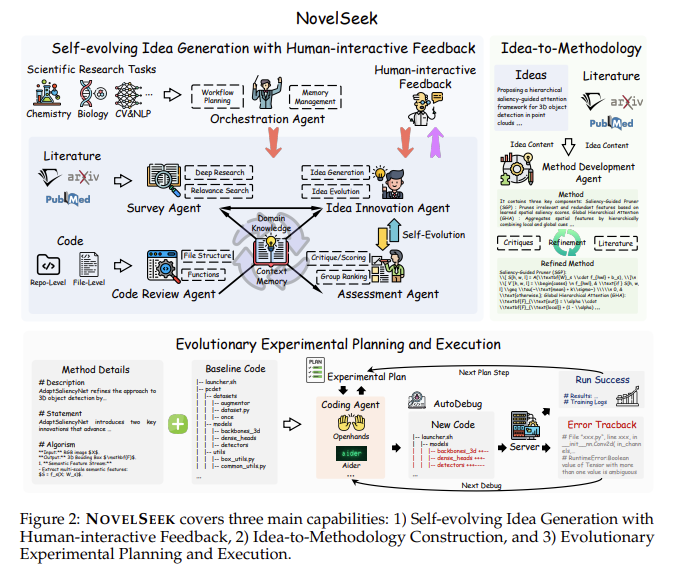Scientific research across fields like chemistry, biology, and artificial intelligence has long relied on human experts to explore knowledge, generate ideas, design experiments, and refine results. Yet, as problems grow more complex and data-intensive, discovery slows. While AI tools, such as language models and robotics, can handle specific tasks, like literature searches or code analysis, they rarely encompass the entire research cycle. Bridging the gap between idea generation and experimental validation remains a key challenge. For AI to autonomously advance science, it must propose hypotheses, design and execute experiments, analyze outcomes, and refine approaches in an iterative loop. Without this integration, AI risks producing disconnected ideas that depend on human supervision for validation.
Before the introduction of a unified system, researchers relied on separate tools for each stage of the process. Large language models could help find relevant scientific papers, but they didn’t directly feed into experiment design or result analysis. Robotics can assist in automating physical experiments, and coding libraries like PyTorch can help build models; however, these tools operate independently of each other. There was no single system capable of handling the entire process, from forming ideas to verifying them through experiments. This led to bottlenecks, where researchers had to connect the dots manually, slowing progress and leaving room for errors or missed opportunities. The need for an integrated system that could handle the entire research cycle became clear.
Researchers from the NovelSeek Team at the Shanghai Artificial Intelligence Laboratory developed NovelSeek, an AI system designed to run the entire scientific discovery process autonomously. NovelSeek comprises four main modules that work in tandem: a system that generates and refines research ideas, a feedback loop where human experts can interact with and refine these ideas, a method for translating ideas into code and experiment plans, and a process for conducting multiple rounds of experiments. What makes NovelSeek stand out is its versatility; it works across 12 scientific research tasks, including predicting chemical reaction yields, understanding molecular dynamics, forecasting time-series data, and handling functions like 2D semantic segmentation and 3D object classification. The team designed NovelSeek to minimize human involvement, expedite discoveries, and deliver consistent, high-quality results.
The system behind NovelSeek involves multiple specialized agents, each focused on a specific part of the research workflow. The “Survey Agent” helps the system understand the problem by searching scientific papers and identifying relevant information based on keywords and task definitions. It adapts its search strategy by first doing a broad survey of papers, then going deeper by analyzing full-text documents for detailed insights. This ensures that the system captures both general trends and specific technical knowledge. The “Code Review Agent” examines existing codebases, whether user-uploaded or sourced from public repositories like GitHub, to understand how current methods work and identify areas for improvement. It checks how code is structured, looks for errors, and creates summaries that help the system build on past work. The “Idea Innovation Agent” generates creative research ideas, pushing the system to explore different approaches and refine them by comparing them to related studies and previous results. The system even includes a “Planning and Execution Agent” that turns ideas into detailed experiments, handles errors during the testing process, and ensures smooth execution of multi-step research plans.
NovelSeek delivered impressive results across various tasks. In chemical reaction yield prediction, NovelSeek improved performance from a baseline of 24.2% (with a variation of ±4.2) to 34.8% (with a much smaller variation of ±1.1) in just 12 hours, progress that human researchers typically need months to achieve. In enhancer activity prediction, a key task in biology, NovelSeek raised the Pearson correlation coefficient from 0.65 to 0.79 within 4 hours. For 2D semantic segmentation, a task used in computer vision, precision improved from 78.8% to 81.0% in just 30 hours. These performance boosts, achieved in a fraction of the time typically needed, highlight the system’s efficiency. NovelSeek also successfully managed large, complex codebases with multiple files, demonstrating its ability to handle research tasks at a project level, not just in small, isolated tests. The team has made the code open-source, allowing others to use, test, and contribute to its improvement.
Several Key Takeaways from the Research on NovelSeek include:
- NovelSeek supports 12 research tasks, including chemical reaction prediction, molecular dynamics, and 3D object classification.
- Reaction yield prediction accuracy improved from 24.2% to 34.8% in 12 hours.
- Enhancer activity prediction performance increased from 0.65 to 0.79 in 4 hours.
- 2D semantic segmentation precision improved from 78.8% to 81.0% in 30 hours.
- NovelSeek includes agents for literature search, code analysis, idea generation, and experiment execution.
- The system is open-source, enabling reproducibility and collaboration across scientific fields.
In conclusion, NovelSeek demonstrates how combining AI tools into a single system can accelerate scientific discovery and reduce its dependence on human effort. It ties together the key steps, generating ideas, turning them into methods, and testing them through experiments, into one streamlined process. What once took researchers months or years can now be done in days or even hours. By linking every stage of research into a continuous loop, NovelSeek helps teams move from rough ideas to real-world results more quickly. This system highlights the power of AI not just to assist, but to drive scientific research in a way that could reshape how discoveries are made across many fields.
Check out the Paper and GitHub Page . All credit for this research goes to the researchers of this project. Also, feel free to follow us on Twitter and don’t forget to join our 95k+ ML SubReddit and Subscribe to our Newsletter.
The post Meet NovelSeek: A Unified Multi-Agent Framework for Autonomous Scientific Research from Hypothesis Generation to Experimental Validation appeared first on MarkTechPost.
Source: Read MoreÂ



